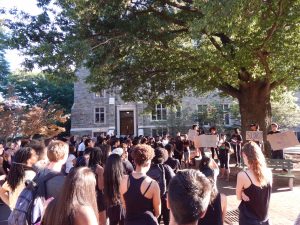Georgetown prides itself on its Socially Responsible Investing (SRI) policy. It remains complicit, however, in unethical investments in harmful companies.
The SRI policy’s mission statement, created in 2017, emphasizes the university’s intent to “integrate its commitment to social justice, protection of human life and dignity, stewardship for the planet, and promotion of the common good into its investment management practices.” According to the mission statement, Georgetown will not invest in unethical companies, notably companies with an “extremely deleterious” effect on the environment or those that are engaged in the production of weapons intended to be used for indiscriminate violence. The Committee on Investments and Social Responsibility (CISR), an advisory board, examines the university’s investments and subsequently makes recommendations on how these investments could become more aligned with Georgetown’s SRI policy.
Despite the university’s intentions, Georgetown’s current public investments—enabled by a weak SRI policy and an unrepresentative, opaque CISR—demonstrate that current mechanisms do not promote real social responsibility in investing. The editorial board recommends several reforms to democratize and strengthen CISR so that it may be held accountable to Georgetown’s SRI policy.
Student organizers have seen moderate success in the past in pressuring Georgetown to partially divest from South African apartheid and pledge full divestment from fossil fuels. While these examples show that divestment activism can be effective, there are institutional barriers to organizing a successful divestment campaign. While we recognize that divestment requires serious forethought and planning given the sheer amount of money in Georgetown’s investment portfolio—roughly $1.08 billion in combined publicly-traded investments, private equity, and venture capital, according to our calculations—unethical investments have serious material consequences for certain marginalized communities. We believe an effective commitment to socially responsible investment requires clear avenues for good faith dialogue between student organizers and investors, which Georgetown currently lacks.
At each step along the way to request a divestment from an unethical corporation, students face challenges that limit their advocacy. First, students must write a proposal to CISR including their aim, rationale, and strategy. The proposal must also include why divestment would be more effective than “engagement,” an alternative practice of letter writing, proxy voting, or dialogue to stop corporations from engaging in SRI-incompatible investments. While some research suggests engagement can be more effective than divestment, divestment can ensure Georgetown’s investments don’t contribute to harmful practices, especially considering that engagement cannot fix corporations that are inherently problematic, such as weapons manufacturers.
Next, student proposals must be evaluated by CISR, a process hampered by the lack of student representation. Of the 12 outlined CISR positions, only four are designated for students: one student each from GUSA, the Georgetown University Law Center Student Bar Association, the Graduate Student Association, and one of the student investment funds. (Student representation is further limited because, according to the membership list, the law center seat is currently vacant.) The remaining positions are reserved for faculty members, representatives of Campus Ministry and the investment office, and president-designated appointees.
We strongly believe half of CISR should be students. Last year’s financial report found that student tuition and fees made up over 46 percent of operating revenue, which doesn’t reflect additional revenue from room and board. Georgetown University cannot exist without the revenue generated through student tuition. SRI was only developed because of student activism around fossil fuel divestment. Socially conscious investment must orient itself around student organizers and ideas, and expanded representation on CISR is one way to improve the system.
The next challenge of crafting a divestment proposal is assessing Georgetown’s investments. Georgetown holds over $100 million in publicly traded assets self-reported every fiscal quarter to the Securities and Exchange Commission and published online. In Georgetown’s most recent disclosure, filed in August, Georgetown reported direct investments in some corporations, but it also reported over $100 million in investments through third-party investing companies, including iShares ETF and Invesco QQQ. How these third parties invest Georgetown’s money remains inaccessible.
There is some indication that these external investors are using Georgetown’s investments for unethical purposes, even if specific investments remain unlisted. For example, Georgetown invested over $40 million in iShares, which in turn invested about two percent of its total investments into producers of nuclear weapons and tobacco products, as well as companies involved with controversial weapons such as cluster munitions and biological weapons. The same fund also ranks in the 21st percentile compared to other funds in its peer groups when it comes to Environmental, Social, and Governance (ESG) strategy. The iShares fund, according to its website, “does not seek to follow a sustainable, impact or ESG investment strategy.” This is in spite of Georgetown’s policy to favor companies with superior ESG strategies.
Many of the university’s disclosed investments also go to companies with poor track records when it comes to human rights and social justice. For example, Georgetown’s endowment has invested $19.5 million into Berkshire Hathaway, a multinational conglomerate with subsidiaries that use prison labor. Other recipients of Georgetown’s multi-million dollar investments, including Amazon and Starbucks, present disturbing patterns of workers’ rights violations. Furthermore, some listed companies contribute to the ongoing Israeli apartheid in occupied Palestine. Google and Amazon jointly entered into a contract to build a cloud computing system for the Israeli government and military, including AI technology for facial detection, which would solidify Israel’s surveillance infrastructure of Palestinians.
Georgetown’s investment in these companies is only the tip of the iceberg; the university doesn’t disclose its private investments, including companies not publicly listed on stock exchanges. According to Georgetown’s fiscal year 2022 financial statement, the university currently invests approximately $313 million in private equity and $486 million in venture capital. Without accessible information on these private investments, students and donors have no means of holding the university accountable to its SRI policy.
The opacity surrounding the university’s investments poses real challenges for students organizing for divestment. Most recently, in March, CISR rejected a proposal to divest from companies connected to the oppression of Uyghurs and other Turkic minorities in China. CISR wrote that it has “not invested in companies ‘that have demonstrated records of widespread violations of human dignity’ in China.” While this statement may be true for the public companies and many of the third party investment companies, it is impossible to truly verify.
Besides investments, we are also concerned about the committee’s lack of transparency when it comes to their decision-making process. According to their Principles and Operating Guidelines, all deliberations remain confidential, unless CISR chooses to publicly disseminate information. There is no explicit requirement for the committee to open meetings for student feedback or to invite proposal authors to speak, further hindering democratic decision-making.
The reasons behind a rejected proposal have empirically been flimsy at best, if not blatantly false or unclear. For example, a 2017 proposal for divestment from the violent Israeli occupation of Palestine was rejected because “divestment would not be an effective tactic to end hostilities or promote a peaceful resolution to the Israeli-Palestinian conflict.” However, there is evidence for the opposite claim. Divestment was integral to dismantling apartheid in South Africa. Israel’s oppression of Palestinians has widely been characterized as apartheid, and both Palestinian and South African organizers have called for forms of divestment from Israel. Despite the historical precedent supporting the student organizers’ calls for divestment, Georgetown refused without any refutation. CISR needs a more democratic and transparent process for students to understand how decisions are made.
Even if we suppose that CISR’s work and recommendations are fully reflective of Georgetown’s SRI policy, any recommendation it makes is simply that—a recommendation. CISR has no binding power to change Georgetown’s investment portfolio; Georgetown’s Board of Directors has the final say in divestment decisions, highlighting a lack of organizational will to fully commit to socially responsible investments. We believe CISR should have more institutional power to hold the Board of Directors accountable.
Beyond having no power over Georgetown’s investment portfolio, Georgetown alarmingly has no control over where third-party companies invest its money. It is stated that external investment managers “will be asked to incorporate the strategies” of Georgetown’s SRI policy and that they should “notify the Investment Office if they make investments that are in conflict with this policy.” But without a robust framework to hold external investment managers accountable, Georgetown cannot guarantee that their investments are ethical.
Because of this lack of oversight of third-party companies, it seems that the university uses investing in them as an avenue to bypass accountability to its SRI policy. For example, when students raised concerns about investments in prison labor, CISR agreed that the students’ concerns were valid, but dismissed a student proposal to divest from prison labor on the grounds that it was “too broad,” because the aforementioned proposal called for divestment not only from prison labor but also from third-party companies who invest in prison labor.
Georgetown’s policy stresses its goal of investing in a manner “consistent with its Catholic mission and Jesuit identity.” However, Georgetown’s unethical investments contradict the values at the core of its Jesuit identity. For instance, the Jesuit value of ‘Faith that Does Justice’ describes an “obligation to address the social realities of poverty, oppression and injustice in our world,” but by investing in corporations complicit in worker abuse, prison labor, and Israeli apartheid, Georgetown violates that mission.
This hypocrisy isn’t accidental either—it’s systemically embedded in Georgetown’s SRI policy itself. The policy states that Georgetown will only entertain socially responsible investments “provided that these investments target a market rate of return on par with similar assets in the endowment” and explicitly states that Georgetown “will not entertain” concessionary returns—returns on investments that sacrifice some level of financial gain to achieve a social benefit.
It is reasonable for investors to dismiss investments that are financial losses, but that is not what the policy says. It says that even if there’s an alternative and profitable investment opportunity that is socially responsible, Georgetown will still favor an unethical investment if it earns more money. However, a commitment to ethical investing sometimes requires settling for a smaller profit margin for the sake of the common good.
For Georgetown’s SRI policy to be anything more than performative, there are several actions the university must take. First, we need transparency. How can we hold Georgetown’s investments accountable if we don’t know where they are going? The university may argue that it cannot be fully transparent because it too doesn’t know where its money goes when it is invested in hedge funds or external investors. This argument, however, would simply be an admission about the profound limitations of its SRI policy.
In order to ensure transparency and accountability, the university ought to conduct an SRI audit, ideally run by an independent entity, to ensure our investments are consistent with our stated values. Further, these reports ought to be made public, detailing the specific industries, companies, and locations in which the university is investing. This is slowly becoming more popular; other universities, such as the University of Pittsburgh, have implemented yearly ESG reports.
Research even shows that effective SRI policies can increase donations. One study found that adoption of SRI policies at universities led to a 6 percent increase in donations as well as more student applications. Simply put, donors—and students—feel more comfortable putting their money toward a university when they know where that money is going.
Not only should CISR increase student representation both on the committee and the deliberation process, the board must be given more binding powers when it comes to enforcing Georgetown’s SRI policy. In a similar vein, any recommendations for ethical investing—regardless of monetary loss—should be prioritized above profit.
Finally, we echo the demands of global activists and student organizers and urge Georgetown to divest from all corporations engaged in human rights abuses and violations of justice and peace in our common home. If Georgetown instead pursues engagement with problematic corporations rather than divestment, we demand that Georgetown release comprehensive documentation of its efforts to pressure corporations into changing their practices, such as through proxy votes or written letters. If engagement proves unsuccessful, Georgetown must transition to divestment.
For Georgetown to live up to its mission of socially responsible investment, it needs both systemic changes to ensure transparency and accountability as well as a genuine commitment to divest from groups committing ongoing social atrocities.






Just an FYI the EU and many others have stated that relating Israel’s situation to South African Apartheid is in fact antisemitic. In fact, the NCBI contagion report found that the linked Amnesty international report was strongly correlated with instances of online antisemitism. I would urge you to reevaluate your biases which show clearly in this piece. Please do not parade antisemitism under the guise of inclusion.
https://www.jpost.com/diaspora/antisemitism/article-710863
https://www.adl.org/resources/blog/israeli-apartheid-week-iaw-2023-featured-expressions-antisemitism